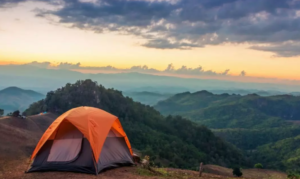 Are you ready to embark on an exhilarating journey that will test your physical and mental limits while immersing yourself in mountaineering? A mountaineering camp offers the perfect opportunity to push your boundaries, acquire essential skills, and forge unforgettable memories in the company of fellow adventurers. This article will explore what to expect from a mountaineering camp and the incredible experiences that await you.
Are you ready to embark on an exhilarating journey that will test your physical and mental limits while immersing yourself in mountaineering? A mountaineering camp offers the perfect opportunity to push your boundaries, acquire essential skills, and forge unforgettable memories in the company of fellow adventurers. This article will explore what to expect from a mountaineering camp and the incredible experiences that await you.
Expert Guidance and Training
In a mountaineering camp, you can expect top-notch guidance and training from experienced instructors and guides passionate about mountaineering. These experts possess extensive knowledge and practical experience in mountaineering, ensuring you receive the best possible education and preparation for your adventures. Upon arrival at the camp, you will be introduced to your instructors, who will provide you with comprehensive training sessions. These sessions equip you with the fundamental skills and knowledge necessary for safe and successful mountaineering. The instructors will cover topics such as:Technical Skills:
You will learn essential skills required for mountaineering, such as knot tying, rope management, belaying techniques, and rappelling. These skills are crucial for your safety while navigating steep terrains, ascending or descending cliffs, and crossing challenging sections during your expeditions.Equipment Usage:
Mountaineering involves specialized equipment, and your instructors will guide you in its proper usage. They will familiarize you with harnesses, carabiners, helmets, crampons, ice axes, and ropes, ensuring you understand how to use them effectively and safely.Navigation and Route Planning:
Understanding navigation is vital in mountaineering. You will learn to read maps, use compasses, and navigate using natural landmarks and GPS devices. Your instructors will teach you how to plan routes, assess terrain conditions, and make informed decisions to ensure a successful and safe ascent and descent.Safety Protocols and Emergency Procedures:
Mountaineering involves inherent risks, and safety is of utmost importance. Your instructors will educate you on essential safety protocols and emergency procedures, including assessing weather conditions, recognizing potential hazards, and responding to emergencies such as injuries or adverse weather situations. They will ensure you are well-prepared to handle unexpected circumstances. Your instructors will be present during practical sessions and expeditions throughout the camp, providing real-time guidance and support. They will monitor your progress, offer personalized advice, and help you refine your techniques. Their expertise and experience will give you the confidence to tackle the challenges that lie ahead and make informed decisions in a mountain environment. By receiving expert guidance and training, you will gain a solid foundation in mountaineering skills, allowing you to navigate the mountains safely and confidently. The knowledge imparted by these instructors will be invaluable, not just during the camp but also in your future mountaineering pursuits.Physical Challenges
A mountaineering camp is designed to push your physical limits and challenge your endurance in various ways. Here is a closer look at the physical challenges you can expect to encounter during your mountaineering camp experience:- Hiking and Trekking: You will embark on hikes and treks through diverse terrains, including rugged trails, forested areas, and alpine meadows. These journeys can range from moderate day hikes to multi-day treks, testing your cardiovascular fitness, leg strength, and stamina. Expect to navigate steep ascents, rocky paths, and uneven surfaces, requiring endurance and muscular strength.
- Altitude: Mountaineering camps are often held in high-altitude locations, presenting a unique physical challenge. As you ascend to higher elevations, the air becomes thinner, and the oxygen levels decrease. This can lead to altitude-related symptoms such as shortness of breath, fatigue, and headaches. Acclimatization is crucial, and you will gradually adapt to the altitude during the camp. Climbing at higher altitudes requires additional physical exertion, making the experience more demanding but incredibly rewarding.
- Technical Climbing: Mountaineering involves technical climbing, which requires strength, agility, and mental focus. You may encounter sections with steep rock faces, icy slopes, or challenging crevasses. These segments demand physical fitness, balance, and precise footwork. Your training sessions will prepare you for these technical aspects, enabling you to overcome obstacles and ascend safely.
- Carrying Heavy Loads: During expeditions, you will often be required to carry a backpack with essential gear, food, and water. These loads can be heavy and add an additional physical challenge to your mountaineering experience. Carrying a weighted pack while navigating steep terrain and long distances will engage your muscles and test your endurance.
- Weather Conditions: The mountains are known for their unpredictable weather patterns, and you will likely encounter various conditions during your camp. This can include intense sun exposure, strong winds, rain, and snow. Dealing with adverse weather conditions requires physical resilience and adaptability to ensure safety and comfort during the expeditions.
- Endurance and Stamina: Mountaineering is an endurance sport that demands prolonged physical exertion. You will spend long hours on the move, sometimes pushing through fatigue and discomfort. Developing endurance and stamina is essential to maintain a steady pace, completing challenging sections, and reaching your desired goals.
Breathtaking Natural Beauty
A significant allure of a mountaineering camp is the opportunity to immerse yourself in the awe-inspiring natural beauty of the mountains. Here's a closer look at what you can expect to encounter and experience during your mountaineering camp: [caption id="attachment_2044" align="aligncenter" width="806"] mountaineering camp[/caption]
mountaineering camp[/caption]
Comments
Post a Comment